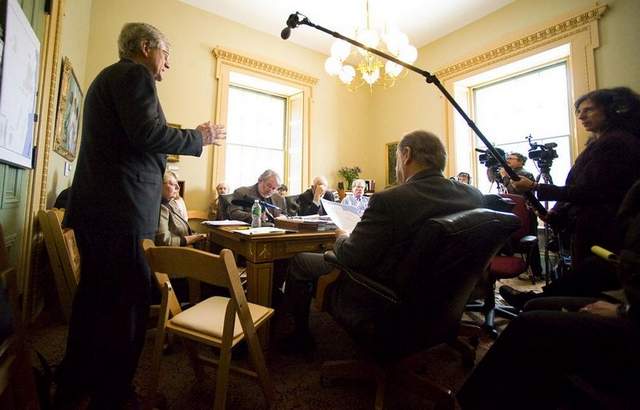Arnie Gundersen: 40 years is not middle age for nuke plants
/This Wednesday, Vermont Yankee will have operated for 40 years. Unlike with people, 40 years old is not middle age for a nuclear power plant. Original documents submitted to the Vermont Public Service Board during the Yankee up-rate hearings showed the plant was designed for 40 years of operation, not 60 years as the Nuclear Regulatory Commission is promoting, and not the new 80-year dream the commission is contemplating for implementation on older reactors.
If the 20-year license extension the commission granted to Vermont Yankee —without a valid Certificate for Public Good issued by the state —takes place starting Thursday, Vermont Yankee will be entering that rarified group of truly old nuclear reactors.
In fact, no large commercial nuclear power reactor has operated for more than 47 years. No navy nuclear submarine or nuclear-powered aircraft carrier has lasted 40 years. The reality is that there are no empirical data to suggest nuclear plants can operate reliably as long as the NRC has now licensed VY to operate.
The Oldbury Power Station in England, formerly the oldest operating nuclear reactor, shut down permanently Feb. 29 at 44 years old, and it is expected to take 80 years to decommission.
Vermont Yankee is now within three years of holding the record as the oldest operating nuclear plant in the world.
This Wednesday, which should herald the shut down of this aging reactor, marks a new transition into uncharted territory for Yankee. On Thursday, if VY continues to operate, it becomes one of only a few nuclear plants experimenting with aging issues the nuclear industry has so far managed unsuccessfully.
If Vermont Yankee is able to complete this 20-year NRC license extension, the plant will be 60 years old at its end in March 2032. In the United States, 18 nuclear plants, most of which were younger than Yankee, already have been shut down permanently. Most have been shut down because they were unreliable and too expensive to repair, but two plants, Three Mile Island Unit 2 and Fermi 1, were closed due to nuclear meltdowns.
Japan's Fukushima Daiichi Unit 1 was a plant very similar to Vermont Yankee before it was the first reactor to explode during last year's triple meltdown following the earthquake and tsunami. When the reactor ruptured March 12, 2011, spewing radioactivity around the northern hemisphere, Fukushima Daiichi had been operating only one month past its 40th birthday.
Nuclear engineers throughout the world are still trying to ascertain why three meltdowns and total containment failures occurred and were totally unanticipated by the nuclear industry and regulators. Weak, structurally inadequate pipes in Unit 1 are expected as one causative factor in its rapid demise.
Like Vermont Yankee, Fukushima Daiichi Unit 1 was a boiling water reactor with a Mark 1 containment, and like Yankee, Fukushima had just received its license extension to operate beyond its 40-year design life. When Fukushima Daiichi 1 exploded, it was only 13 months older than Vermont Yankee is now.
A nuclear design that explodes is not considered clean, safe or reliable. Yet all of the significant design features in the Fukushima Daiichi Unit 1 were identical to those at VY, except that Fukushima was designed to withstand a stronger earthquake.
What can Vermonters expect from Vermont Yankee during the next two decades? Hopefully, the fate of Fukushima Daiichi 1 will be avoided, but aging phenomena certainly will take their course. And, while Vermont might be anticipating a 20-year ongoing relationship with Yankee, there is no long-term commitment by Entergy and VY. The continued operation of Vermont Yankee is very much a year-to-year decision by Entergy's management, based upon how much money is being made for Entergy versus the investments necessary to keep the plant running.
Vermont Yankee's tired condenser, one of the oldest in the US, must be replaced at a cost in excess of $200 million. At about the same time, safety back-fits, anticipated to cost about $100 million and required by the NRC as a result of the Fukushima Daiichi triple meltdown, will be forced upon the aging plant in 2016.
Will Entergy spend an additional $300 million on such an old plant when the oldest plant has reached only 44 years old? I have always maintained that Entergy and VY are all about economics and profit margins rather than reliability and long-term investment and job creation in Vermont.
I was the first chair of the Vermont Yankee Oversight Panel, which stated in its 2010 report:
"No report written today can state conclusively that Vermont Yankee will or will not be operated reliably for an additional 20 years. ... The Panel also recognizes several key management concerns that have not been rectified or addressed. Moreover, it appears that some of these broad concerns may in fact be as persistent in 2010 as in 2009. Entergy cannot operate VY reliably for an additional 20 years unless it successfully reestablishes a corporate culture where its individual employees and the organization as a whole have a questioning attitude, and where adequate resources are consistently spent on non-safety systems."
Although it might appear the state of Vermont was outspent by Entergy and its lawyers in federal court in its stated desire to operate for 20 more years, the economic reality of operating an old Mark 1 boiling water reactor on the banks of the Connecticut River likely will lead to its shut down much sooner than 2032.
Arnie Gundersen lives in Burlington and is the chief engineer for Fairewinds Associates, a paralegal services and expert witness firm specializing in the review of nuclear engineering, reliability and safety issues. He earned his bachelor's and master's degrees in nuclear engineering from RPI, was a senior vice president for a nuclear services firm, has a reactor operator's license and holds a nuclear safety patent.
Source: Burlington Free Press


